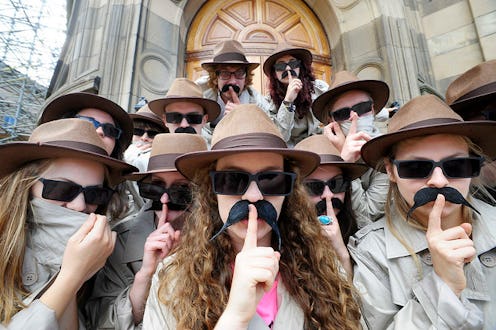
Even though we're living in the selfie moment, in which we find revelatory meaning in every picture we post and where there's no such thing as an overshare (even when it poses a health risk), it's still good to have secrets you only keep with yourself. Yes, things you tell no one. I'm not referring to the usual suspects like your social security number or your PIN; I'm talking about red letter announcements, the sort of admissions that are sometimes called "brave."
The new brave, according to writer Sharon Jones, might be savoring your privacy. In her debut book Burn After Writing , Jones invites you "to play a game of Truth or Dare with yourself. How honest can you really be with only yourself watching?" This is a challenge — and a welcome one in a time when many of us groom our own online profiles with the fanaticism of the most overbearing pageant mom.
Even if you're skeptical, don't worry. Jones makes the task of secret-hoarding painless. Her book is like one of those enormous surveys that circulate every now and then, by email or on Facebook, surveys that ask you to record — and share, I might add — information like "First Kiss?" and "Coke or Pepsi?"
What Jones has figured out in Burn After Writing is that the best part of those surveys is never reading some one else's answers (sorry, high school best friends with whom such surveys were endlessly exchanged); rather, it's taking a 500-question survey and thinking about yourself and writing about your life. That's it.
If you're not quite ready to spill your guts and keep the mess under cover, you can still get the best parts of secret-keeping out of your daily life right now. Here are seven good reasons why you should probably swallow the proverbial key to your diary ASAP.
"Will your descendants ever read your Facebook Timeline?"
Jones' isn't so sure. "In the age of infinite and instant reproduction only the unique is still beautiful," she writes. She suggests keeping the most authentic parts of yourself sacred.
"You can't look at something without changing it; you can't look at yourself without changing."
According to Jones, remembering is always a process of reinvention. When you share every moment of your life, you commit more of those memories to public — or semipublic — record. By keeping some recollections to yourself, you empower yourself to analyze and reassess your life's narrative, to better understand how the events of your past continue to shape your present.
"The only way to really see the present is to be outside of it."
In other words, you need to stop time. Seems impossible, right? Well, it's extra-impossible when you're trying to multitask. (And, per Jones' rules, anything other than reflecting on and writing about your life, by hand, in private, is multitasking.) Keeping your sense of the moment private allows you to "freeze your restless subjectivity," free of judgement. (In other words, no one's telling you how you feel about this morning's stressors is wack.)
"Everybody tells you these are the best days of your life. So much pressure!"
Enough pressure, in fact, to make a person collapse. There's the pressure to look good in your pictures, to post something funny, to post something authentic, to post something that won't offend your grandma: this list goes on. Whether you're worried about bullying or the Facebook blues, outsiders can make it hard to be true to yourself. That's why keeping your feelings to yourself can be a good thing. Sure, you might be your own worst critic, but at least you can hop into a self-reflexive game of double dutch and tell yourself that you shouldn't be so hard on yourself for not having the time of your life at last night's party. And Jones is quick to offer reassurance: "Nobody else is really having more fun than you are. They're all just pretending."
"Sidestep your mental filters and cut to the chase."
When you're not trying to impress anyone — not even yourself, you're able to be honest and real with yourself. Policing your thoughts and trying to fit them into a pre-existing mold for how you think you should feel is a tried and true recipe for disaster.
"You might be surprised at what you discover about yourself through the magical power of randomness."
In addition to prompting readers to reflect on their lives, Jones' book includes lists of meaningful — and maybe less meaningful — words for you to free associate with. Here's a sample. On a piece of paper (that you will show NO ONE), write down the first thing that comes into your head when I say the word... "mother." (If your mind went to denim, let's be friends.)
"Your 'self' is just a construct, a thing you make and remake every day."
The controls should be in your hands — not in the hands of digital acquaintances. Trust yourself to be with yourself.
Images: Amnesty International UK/Flickr; Giphy (7)